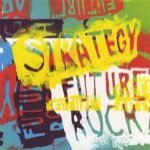
Strategy Future Rock
(Kranky)
Future Rock is not a rock album, and though musically visionary it is not a product of any forseeable future. It is deeply entrenched, in fact, in the past, a fine work that absorbs the good bits of one man's life in the oughts.
At least three years were spent on the making of this album. Paul Dickow, the man who is Strategy, incorporates fragments and grooves from all means of recorded sources from that time and before, creating a format for the noodlings, rehearsals, and sound residue to grow anew into a different, cohesive whole. This is a mysterious and ungenrefiable album. I don't know if anybody else catches themselves in reverie thinking about how great it would be to drive up to the farm to be alone with all of the music and devices I need to get my clustered mental groove onto wax, but this is the record that might result if it was done perfectly. Strategy isn't even making this from a farm, he's making it from Portland.
If I had to say this evoked any kind of music, the closest candidate would be dub, where a very structured pop medium gets warped through production into a psychedelic, personal, non-linear space. That's not to say this sounds like a dub album, as so many elements evoke several eclectic genres, often within the same composition, that Future Rock isn't tethered to any element as simple as "reggae" (though the title cut builds itself around some echoing keys Mad Professor would approve of). The music approaches complete fluidity, and any attempt to pin it down vaporizes. Touches of ambience, house, funk, post punk, hip hop, and on and on flirt with prominence, but everything is contained in a distant vaccuum that it is impossible to pinpoint the transformations. Percussion is sometimes very prominent and sometimes absent, but the psychic rhythm is so present that neither is conspicuous.
Made and finessed to something unheard before over years of fragment collecting, Future Rock is nearly bottomless and ironically will someday make a great sample source. It is atmospheric, but not just in the generic sense. The album as a whole and each composition create such a complete environment that it is easy to get entranced and overlook just how tight some of the programming is. When vocals occur, they are tuned to this wavelength, vocoderized, laid back, and existing wholly within the mix rather than atop it. There are magical, humble, soulful robots wandering around here singing to themselves. The best instances are Can't Roll Back and the mesmerizing Stop Spinning, which weds a sparse downbeat percussion with steady synth and production to prop up a patient, utterly narcotic chorus.
This is electronic music, it is experimental, it does combine drums, piano, and electric guitar with computer programming and tape loops with field recordings and fuzz. Lightly considered, it may feel like another, albeit, good example of audio dickery that belongs on Kranky. This is the rare recording, however, that truly creates its own world incomparable to even the music it draws upon, without creating its own box within which it can be reduced. I try to describe why this appeals to me and get lost in frustrating abstractery, but it is to the album's credit, as it creates its own uncanny space greater and separate from the sum of the many parts that make it. Maybe it is not "futuristic" in a familiar sci-fi sense, but it is adrift from any time present or past, just as it is unwed from any well trod formula. That said, because it happened to be released on a specific date, Strategy's Future Rock is one of the best albums of 2007.
4 October, 2007 - 16:38 — George Booker